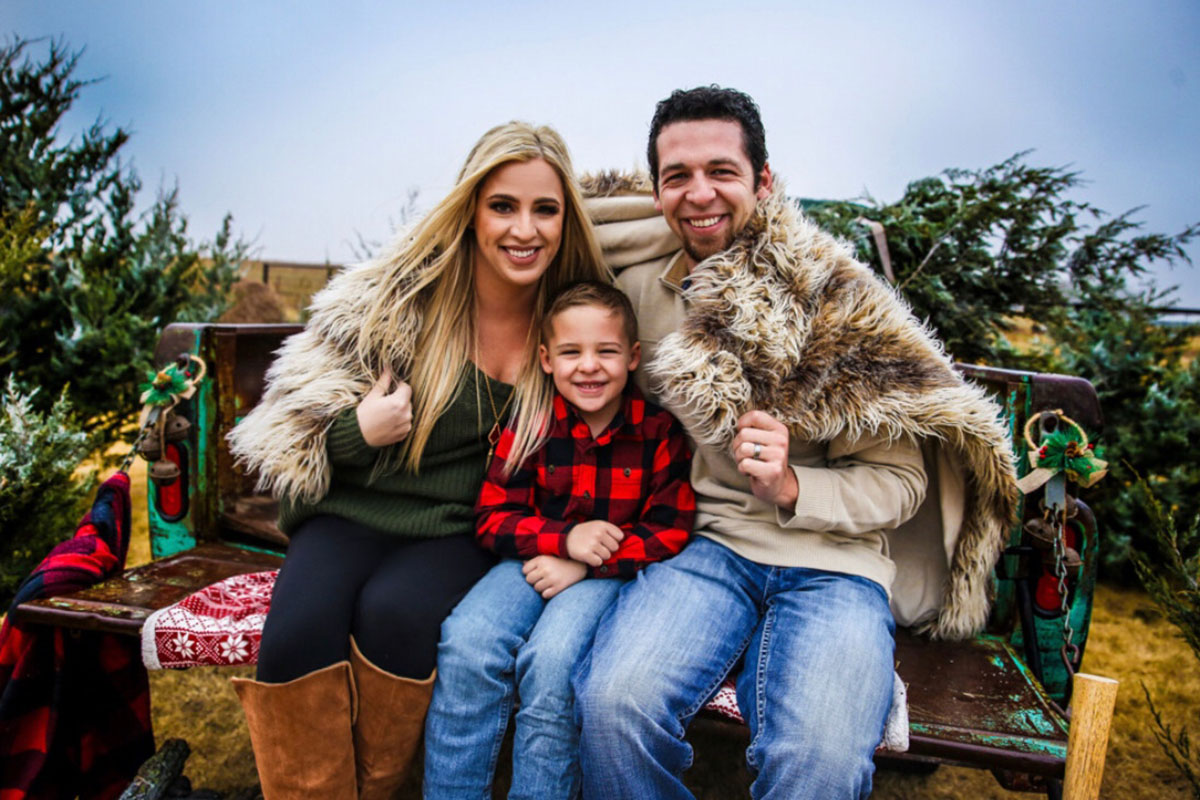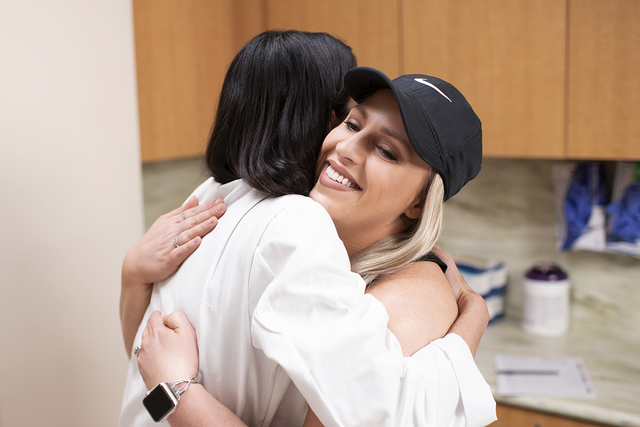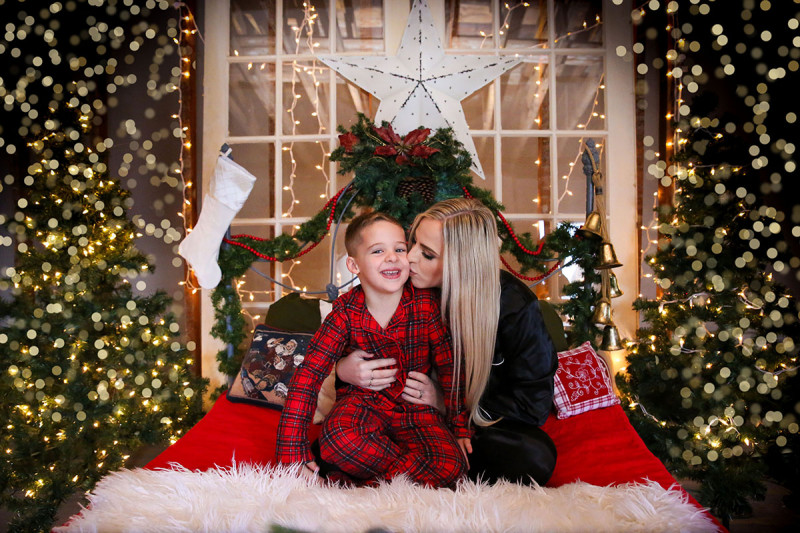Kara Kenny was just 28 years old when she was diagnosed with rectal cancer.
It turns out that Kara is part of an alarming trend. A growing number of people are being diagnosed with colon and rectal cancer who are younger than 50. That’s typically the age to begin screening for colorectal cancer. To help, in March 2018 Memorial Sloan Kettering established the Center for Young Onset Colorectal Cancer, the first program anywhere focusing on the specific needs of people in their 20s, 30s, and 40s who are facing colorectal cancer.
MSK founded the first program in the country devoted to the specific medical, emotional, and lifestyle needs of people under 50 years old with colorectal cancer.
Because of her age, when Kara was admitted to MSK in December 2018 she was automatically enrolled in the center. Behind the scenes, procedures geared toward younger adults swung into action, including having a counselor talk to Kara about fertility issues and arrange accommodations in New York for Kara and her mother, who live in Oklahoma and Arkansas. The center also ran genetic tests to see if Kara’s family was predisposed to colorectal cancer.
Below, Kara describes her experience in her own words.
I named my tumor Helga.
I’m not sure why I decided to name it, but I don’t like saying the word “tumor” all the time. Now my friends and family use it too. When they want an update, they ask, “So what’s the plan for Helga?” If you don’t do something to make yourself laugh, it can get pretty overwhelming.
But there is no way to joke about the ordeal I went through to get diagnosed. I’m usually a pretty private person, but rectal cancer demands real talk. I began experiencing rectal bleeding when I was 26. I knew that something wasn’t right, but doctors told me it was hemorrhoids and I should add more fiber to my diet.
After fighting the rectal bleeding for two years and being told a colonoscopy was not beneficial, I finally pleaded to have one done. Once I asked for the colonoscopy, the response I was given was: “Would that give you peace of mind?”
When I woke up from the procedure, I heard the words you never want to hear: “You have cancer.”
I’m from a small town in Oklahoma. The largest nearby city is Oklahoma City, which is two and a half hours away. My family immediately took action and quickly decided I was getting the best possible care, no matter what it took or where it was. As a renowned cancer center, MSK was our first choice to receive world-class medical care. Just one week after my diagnosis, I flew to Manhattan with my mother and husband.
Getting Help in a New York Minute
At MSK, this proud Oklahoman learned what the phrase “in a New York minute” really means. In one day, I met both my medical oncologist, Diane Reidy Lagunes, and my surgical oncologist, Martin Weiser. I had CT scans performed, lab work done, and an MRI completed. All of this happened in about five hours. That just doesn’t happen where I come from.
Just two days before Christmas, we had to hustle through crazy New York traffic to jump on a plane back to Oklahoma, so we could spend the holiday with our son, Preston. He loves Christmas as any 5-year-old does.
Unfortunately, there was no holiday miracle involving Helga. Dr. Reidy Lagunes called to inform me that the scans showed the tumor had spread to nearby lymph nodes and the sphincter and was encroaching on my vaginal wall. I needed to start treatment immediately. Thirteen days after having a colonoscopy, I began an advanced chemotherapy regimen to treat stage III rectal cancer.
Chemo Sucks
I knew very little about chemotherapy before I started treatment. Back home in Oklahoma, I received chemo under the direction of my care team at MSK in New York. I figured I had youth on my side, and that should count for something. Chemo was a big reality check.
Every person’s experience is unique. For me, the side effects of the regimen I was given were extremely rough, including very painful constipation, nausea, fatigue, and a loss of feeling in my hands and feet called neuropathy. Then came the hair loss. My long blonde hair has always been my security blanket. Chemo made more than 90 percent of my hair fall out, and I hate wearing hats.

I told myself, “It’s just hair. It will grow back.” But when you look at yourself in the mirror and see someone you don’t recognize, it’s no longer just hair. Still, I’ve learned to face that person, put on a hat, and know I am one day closer to regaining my health.
New York City Treatment
After eight rounds of infusion chemo every other week, I returned to MSK for the next phase of my treatment: chemoradiation. Jennifer Mueller performed surgery to reposition my ovaries. This was to help reduce the chance that radiation therapy would induce my body to go into early menopause.
As a woman in my 20s with cancer in my lower body, I had a lot of hard realities to consider. When I first arrived at MSK, counselor Barbara Golby asked if I wanted to discuss how treatment would affect my ability to bear children. Thankfully, my husband and I were blessed with Preston, and we had already decided long before my diagnosis that he would be our only child.
I also decided to confront whether my genes put me and my family at greater risk for colorectal cancer because of genetic conditions, such as Lynch syndrome. To my relief, tests done at MSK showed that I do not have those genes, so I don’t have to worry I’ve passed them on to my son. Like every family facing cancer, we agonize over what to reveal to him about my prognosis, how much a child can process, and how Mommy’s sickness affects him.
The encouraging news was that the efforts to evict Helga made real progress. Dr. Weiser told me the tumor was “shrinking beautifully,” thanks in part to the infused chemotherapy.
I’m a country girl who loves wide-open spaces, therefore New York City is not for me. Thankfully, good hearts exist everywhere. Although I wish I never had to meet them under these circumstances, I am so grateful for the compassion of Dr. Reidy Lagunes and her wonderful nurse Elizabeth Cruz, as well as Drs. Weiser and Paul Romesser, and the incredible people who work with them. I feel how much they want to help me as a person — not just treat me as a patient — and that means the world to me.
I’m also grateful for programs that try to make cancer a little easier to deal with. For instance, in New York my mother and I stay in an accommodation called Hope Lodge provided by the American Cancer Society that houses patients and caregivers. Instead of renting a car or taking taxis to my appointments, every day I’m in New York, we take an MSK shuttle bus.
The Road Ahead
My cancer experience still has many chapters that are yet to be written. For instance, Dr. Weiser says that surgery will probably be necessary to fully remove the tumor and affected lymph nodes. If so, I hope I will not be forced to use a colostomy bag for the rest of my life, which is a pouch on the outside of the body to collect waste since the regular plumbing isn’t functioning. After what I’ve gone through so far, I expect there will be setbacks and challenges I probably can’t imagine right now. But I am incredibly grateful to have so much love and support in my life.
Helga, game on.




